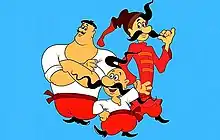Cossacks (cartoon series)
Cossacks (Ukrainian: Козаки) is a series of Ukrainian animated comedy short films originally shot at the Kyivnaukfilm film studio and in later series created by the UkrAnimaFilm and Baraban animation studios. This series has also sometimes been titled "Kak Kazaki" (Как Казаки).[1] The author of the original script and director was Volodymyr Dakhno.[2][3] The first episode was released in 1967 and was titled "How the Cossacks cooked kulish".[4] The cartoon immediately gained popularity and its heroes became Ukrainian cartoon classics.[5][6]

Description
Loosely based on Alexander Dumas' three musketeers,[7][8] the series features the adventures of three Zaporozhian Cossacks: Burmylo, Korotun and Sylach,[9] also in the script called Gray, Oko, and Tur,[2] who are always portrayed nameless. Director-animator Volodymyr Dakhno describes them as having unique personalities: "Gray turned out to be cunning and prudent, Tur - shy and sentimental, and Oko - cheerful and belligerent."[2]
The depiction of the characters referenced Zaporozhian Cossacks, iconic in the Ukrainian imagination. Eleanor Cowen in her book, "Animation Behind the Iron Curtain" summarized the historical reference for the cartoon series:
"With their distinctive clothing and men boasting impressive mustaches, the Cossacks were notorious as hard drinking rebels who turned into a semi-independent society in the 16th and 17th centuries. Their members rejected serfdom and fought for independence from foreign rule. Though the historical Cossacks lost their autonomous status by the late 18th century, their cultural mystique lives on in the Ukrainian consciousness. Cossacks are to Ukrainians what cowboys are to Americans, seen as spirited renegades and frontiersmen. They remain colorful, heroic characters in the Ukrainian imagination."[10]
In the cartoon series, the characters get into various adventures, meeting people from different countries and eras, even gods and aliens.[9] There are no dialogues in the cartoons or any text, except for the introductory or concluding word "from the author" - the action takes place in the form of intuitive scenes.[11]
History
In total, nine cartoons about the Cossacks were originally created.[9]
| Year | English translation | Original title |
|---|---|---|
| 1967 | How Cossacks cooked Kulish | «Як козаки куліш варили» |
| 1969 | How Cossacks searched for happiness | «Як козаки щастя шукав» |
| 1970 | How Cossacks played football | «Як козаки у футбол грали» |
| 1973 | How Cossacks rescued the brides | «Як козаки наречених визволяли» |
| 1975 | How Cossacks bought the salt | «Як козаки сіль купували» |
| 1978 | How Cossacks became the Olympians | «Як козаки олімпійцями стали» |
| 1979 | How Cossacks helped the Musketeers | «Як козаки мушкетерам допомагали» |
| 1984 | How Cossacks enjoyed the wedding | «Як козаки на весіллі гуляли» |
| 1987 | How Cossacks met the aliens | «Як козаки інопланетян зустрічали» |
In 1988, Anatoliy Havrylov (cinematography), Volodymyr Dakhno (film director) and Eduard Kirych (character artist) were awarded the Shevchenko National Prize for their work on the series.[12]
In 2012, the characters were considered unofficial mascots during Ukraine's hosting of UEFA Euro 2012.[9][13]
In the early 2010s, the Ukranimafilm studio began preparing for the release of additional episodes of the animated series, "How the Cossacks…", which was to include 13 episodes. It was planned that the favorite characters would appear before the audience in the spring of 2014.[14] The premiere of the new series took place in 2016 and 2018.[15] This new series was worked on by the Ukrainian non-commercial animation studio, Baraban Animation Studio.[16]
References
- Dakhno, Vladimir, Kak kazaki nevest vyruchali (Animation, Short, Comedy), Kievnauchfilm, retrieved 2022-10-31
- "Володимир Дахно. Як козаки в тридев'яте царство не дійшли". www.ukrinform.ua (in Ukrainian). Retrieved 2021-04-08.
- ""Як козаки…": сьогодні народився автор всенародно улюблених мультфільмів". 5 канал (in Ukrainian). Retrieved 2021-04-08.
- Kak Kazaki Kulesh Varili (Как Казаки Кулеш Варили), retrieved 2022-11-03
- "Українські виробники мультфільмів здатні конкурувати на світовому ринку – Ткаченко". www.ukrinform.ua (in Ukrainian). Retrieved 2021-04-08.
- "Замість Троє із Простоквашино. Шість культових українських мультфільмів". nv.ua (in Ukrainian). Retrieved 2021-04-08.
- "Історія української анімації: все про Грая, Тура і Око - наших мультяшних козаків". ukraine.segodnya.ua (in Ukrainian). Retrieved 2023-03-04.
- "Історія української анімації: все про Грая, Тура і Око - наших мультяшних козаків". ukraine.segodnya.ua (in Ukrainian and English). Retrieved 2023-03-04.
- "Discover Ukraine Through Film – Ukraine for Kids". en.hromadske.ua. 19 May 2020. Retrieved 2021-04-08.
- Cowen, Eleanor (2020). Animation Behind the Iron Curtain. Bloomington: Indiana University Press. pp. 62–63. ISBN 978-0-86196-974-6. OCLC 1303087621.
- "10 Ukrainian cartoons which make your children smarter". UaPost - Ukrainian American Media. Retrieved 2021-04-08.
- "Гаврилов Анатолій Михайлович | Комітет з Національної премії України імені Тараса Шевченка". knpu.gov.ua. Retrieved 2022-11-01.
- "Продюсер Едуард Ахрамович розповів, як створювався мультсеріал Козаки. Футбол". Офіційний сайт каналу 1+1 - 1plus1.ua (in Ukrainian). Retrieved 2022-11-01.
- Oliinyk, Valentyna (2014-08-06). "Cossacks are coming back!". День. Retrieved 2021-04-08.
- "Нові українські мультфільми, які підійдуть для затишного вечора з дітьми". 24 Канал (in Ukrainian). Retrieved 2021-04-08.
- "ФК "Шахтер" представит мультфильм "Как казаки на "Донбасс Арене" будут в футбол играть"". Kyiv Daily. December 19, 2017. Retrieved November 1, 2022.